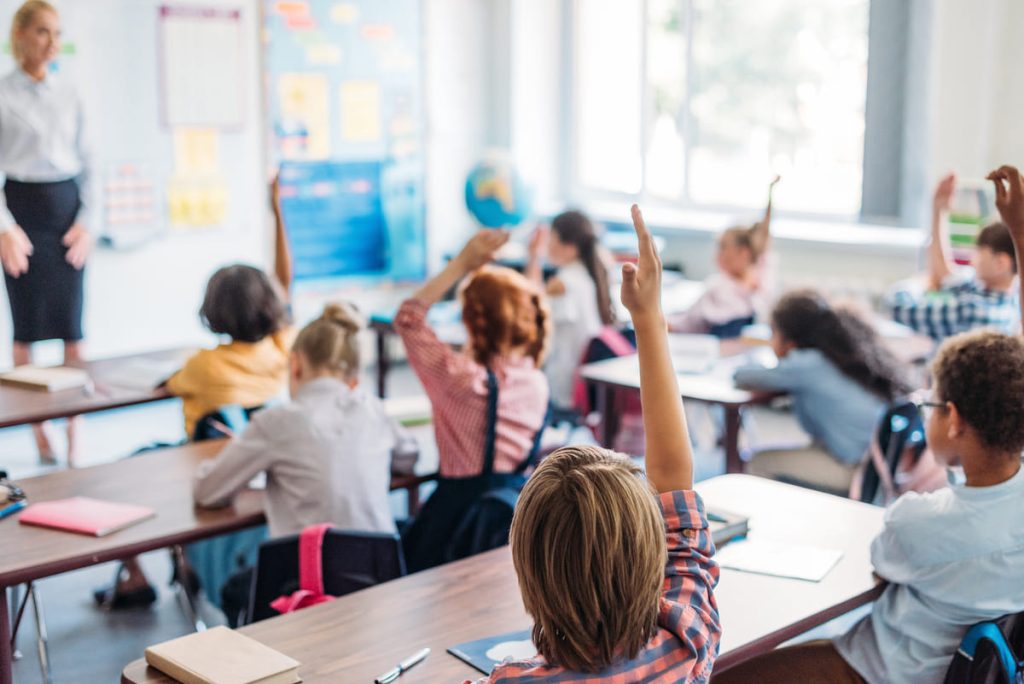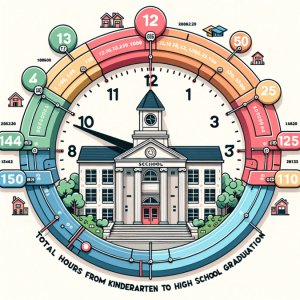Education Tips and Challenges
What Is 11520 Education: A Brief Overview

11520 education is a unique approach to education that emphasizes the importance of using the 11520 hours that a student typically spends in school from kindergarten through high school graduation effectively to maximize learning outcomes. It is a holistic approach that focuses on creating a supportive and engaging learning environment to ensure that students receive a quality education that prepares them for success in life.
Key Takeaways:
- 11520 education is a unique approach to education that emphasizes the importance of using the 11520 hours that a student typically spends in school from kindergarten through high school graduation effectively to maximize learning outcomes.
- The approach can be applied to any educational context, regardless of the educational system or program.
- 11520 education encompasses a comprehensive learning strategy integrating academic, practical, and emotional growth.
Understanding 11520 Education

11520 Education is an innovative approach to teaching and learning that emphasizes the importance of maximizing the time students spend in school.
The term “11520” refers to the number of hours a student spends in school from kindergarten through high school graduation.

This approach recognizes the need for change in traditional educational methods and seeks to address the evolving needs of students in today’s fast-paced, technology-driven world.
One of the key principles of 11520 Education is the development of critical thinking and problem-solving skills. This approach acknowledges that students need to be able to think critically and solve problems to succeed in today’s complex world.
Students are better equipped to tackle real-world challenges and make informed decisions by focusing on these skills.
Another important aspect of 11520 Education is the emphasis on creativity. This approach recognizes that creativity is an essential component of innovation and that students must be encouraged to think creatively to develop new and innovative ideas.
Technology is also a key component of 11520 Education. This approach recognizes the importance of technology in today’s world and seeks to incorporate technology into the learning process in meaningful ways. By using technology to enhance the learning experience, students can better engage with the material and develop the skills they need to succeed.
The Role of Technology in 11520 Education
Technology has been pivotal in revolutionizing 11520 education, ushering in an era of personalized, engaging, and flexible learning:
- Learning Management Systems (LMS): Platforms like Google Classroom, Blackboard, and Canvas streamline the teaching process by centralizing assignments, quizzes, and discussions.
- On-the-Go Learning: Thanks to technology, students can access learning materials anytime, anywhere, fostering a self-paced, flexible learning environment.
- Expansive Online Resources: Platforms like Khan Academy and Coursera offer students diverse educational content, from lectures to interactive simulations.
- Immersive Learning Tools: Innovations such as virtual reality and gamification have deepened student engagement, transforming how material is understood and retained.
Basically, technology has not only enriched 11520 education but has also democratized it, ensuring learning is more accessible, interactive, and tailored to individual needs.
Teaching and Learning Methods
11520 Education recognizes the need for change in traditional educational methods and seeks to address the evolving needs of students in today’s fast-paced, technology-driven world.
Achieving this encompasses a comprehensive learning strategy that integrates academic, practical, and emotional growth.
Teaching methods in 11520 Education focus on creating a supportive and engaging learning environment to ensure that students receive a quality education that prepares them for success in life. Personalized learning is a key component of this approach, which allows students to learn at their own pace and in their own way.
Project-based learning is another method used in 11520 Education, where students work on real-world projects that require critical thinking, collaboration, and problem-solving skills.
Individualized learning is also emphasized in 11520 Education, where teachers tailor their teaching methods to meet the unique needs of each student. Mastery-based learning is another approach used in 11520 Education, where students are given the opportunity to master a skill or concept before moving on to the next one.
While rote memorization is still used in some cases, it is not the primary focus of 11520 Education. Instead, student-centered learning is emphasized, where the student is at the center of the learning process, and the teacher acts as a facilitator.
This approach allows students to take ownership of their learning and develop critical thinking skills.
Benefits of 11520 Education
11520 Education emphasizes social and emotional learning, which is the process of developing self-awareness, self-management, social awareness, relationship skills, and responsible decision-making skills that are essential for success in school, work, and life.
This approach has been shown to lead to improved student engagement, motivation, and confidence, as well as enhanced learning opportunities and better preparation for future success.
By focusing on the whole student and providing real-world connections to their learning, 11520 Education can help students see the relevance of their learning and increase their interest in their education. This can lead to improved learning outcomes, progress, and a lifelong love of learning.
Additionally, it can positively change the quality of education overall. By incorporating innovative approaches to teaching and learning, this approach recognizes the need for change in traditional educational methods and seeks to address the evolving needs of students in today’s fast-paced, technology-driven world.
KinVibes Pro-tip: Embracing a blend of traditional teaching methods with cutting-edge technology not only enhances the educational experience but also prepares students for the tech-driven future, fostering resilience, adaptability, and a lifelong love for learning.
Challenges and Solutions

Implementing 11520 Education presents several challenges:
- Funding: Adequate funding is a primary concern. Schools can explore government grants, private organizations, or business partnerships to alleviate these financial burdens.
- Resistance to Change: Some educators may be reluctant to embrace new teaching and assessment methods central to 11520 Education. Offering training and support can assist in highlighting the benefits of this approach and its positive impact on student outcomes.
- Assessment: Traditional methods might not capture student progress holistically. To address this, schools can adopt alternative methods, like project-based assessments, which better gauge skills such as critical thinking and collaboration.
Solutions include:
- Providing ongoing professional development for staff to reinforce understanding and endorsement of 11520 Education.
- Actively seeking alternative funding avenues.
- Continuously training educators to ease the transition and reduce resistance to new methodologies.
Role of Stakeholders in 11520 Education
Stakeholders in education play a vital role in implementing the 11520 Education Law. Policymakers, educators, parents, and students are all stakeholders in the education system and have a vested interest in ensuring that it is effective and meets the needs of all students.
Policymakers are responsible for creating policies that support the goals of the 11520 Education Law.
They must ensure that the policies are aligned with the law’s principles and that they are effective in achieving the desired outcomes. Policymakers must also ensure that there is adequate funding to support the implementation of the law.
Parental involvement is critical to the success of the education system. Parents must actively participate in their children’s education and support their learning at home. They must also be engaged in decision-making and provide feedback to educators and policymakers.
Educators play a crucial role in the implementation of the 11520 Education Law. They must be trained in innovative teaching methods and ensure the curriculum aligns with the law’s principles. Educators must also be committed to providing all students with a safe and inclusive learning environment.
Students are the most important stakeholders in the education system. They must be actively engaged in the learning process and have access to resources that support their academic, practical, and emotional growth. Students must also be empowered to provide feedback on their learning experiences and participate in decision-making.
Professional Development and Support
A supportive and engaging learning environment is essential to ensure that students receive a quality education. This involves ongoing professional development for faculty and staff to ensure they understand and support the 11520 Education approach. Professional development opportunities can help teachers expand their knowledge base in different subjects, such as math, history, science, and more.
In addition to professional development, creating a supportive learning environment requires ongoing support for both students and teachers. Teachers need to have access to resources and support to help them implement the 11520 Education approach effectively.
This could include funding through government grants, private organizations, or business partnerships to offset costs.
Moreover, ongoing professional development and support can help bolster employees’ confidence in their work. Greater confidence can translate into higher overall job satisfaction, employee performance, productivity, and overall morale. Investing in professional development training programs also shows employees that their company is invested in their success, which can lead to increased loyalty and retention.
Inclusion and Equity in 11520 Education
11520 education promotes both inclusion and equity, ensuring that every student, regardless of background or circumstances, has an equal opportunity to thrive in a supportive learning environment. Central to its philosophy are the following:
- Inclusion: Recognizing and addressing diverse student needs, particularly those from disadvantaged backgrounds who might encounter unique educational challenges.
- Equity: Removing barriers to learning, ensuring that all students have the same chances for success.
To embody these principles, educators should remain attuned to individual student needs and provide necessary resources, from tutoring to counseling, fostering a truly inclusive and equitable educational setting.
Assessing Progress in 11520 Education

Assessing progress in 11520 education is crucial to ensure that students receive a quality education that prepares them for success in life. Various assessment methods are used in 11520 education, including formative and summative assessments.
Formative assessments are used to monitor student progress throughout the learning process. These assessments are used to provide feedback to students and teachers, allowing them to adjust their teaching and learning strategies as needed.
Examples of formative assessments in 11520 education include class discussions, quizzes, and homework assignments.
Summative assessments, on the other hand, are used to evaluate student learning at the end of a unit, course, or school year. These assessments are used to determine whether students have met the learning objectives and standards set forth by the school or educational system. Examples of summative assessments in 11520 education include standardized tests, final exams, and portfolios.
While standardized tests are commonly used in 11520 education to assess student learning, they have been subject to criticism in recent years.
Critics argue that standardized tests do not accurately measure student learning and may lead to a narrow focus on test preparation rather than a well-rounded education.
Despite these criticisms, standardized tests remain a common assessment method in 11520 education. Schools and educational systems may use a variety of standardized tests, including state-mandated tests, college entrance exams, and international assessments such as the PISA.
In addition to standardized tests, schools and educational systems may also use alternative assessment methods, such as performance- and project-based assessments. These assessments may provide a more comprehensive view of student learning and may be better suited to assess critical thinking, problem-solving, and creativity skills.
Future of 11520 Education
The 11520 Education model is poised for a transformative future, aligning education with the demands of our rapidly evolving, tech-centric society. Its core tenets include the following:
- Innovation: Pushing educators to adopt groundbreaking tools and methods, ensuring interactive and stimulating learning experiences that bolster critical thinking.
- Interdisciplinary Learning: Promoting a broader view beyond traditional subjects, enabling students to connect and understand the interplay between diverse fields and gain a comprehensive worldview.
- Social and Emotional Learning: Prioritizing students’ holistic development by fostering academic prowess and the essential social and emotional competencies needed in complex societal settings.
- Flexibility: Recognizing students’ diverse learning styles, the approach tailors education to individual needs, fostering personal growth.
- Holistic Knowledge Acquisition: Beyond just absorbing information, 11520 Education stresses the importance of ingraining values, critical thinking, creativity, and communication skills.
To really prepare students for a dynamic future, 11520 Education equips them with the multifaceted skills essential for 21st-century challenges. Realizing its potential necessitates educators with a growth mindset and a zeal for innovation, ensuring students remain at the forefront of global advancements.
